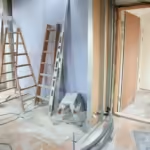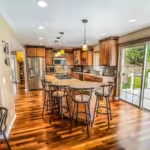Expert Warnings Every Homeowner Should Know
When embarking on a home improvement journey, most homeowners focus on the major expenses like materials, labor, and permits. However, seasoned property experts warn that hidden costs can quickly add up, turning a well-planned renovation into a financial burden. Whether you’re renovating your kitchen, adding an extension, or simply updating your home’s aesthetics, it’s crucial to anticipate these often-overlooked expenses to stay within budget.
The Importance of Budgeting for Hidden Costs
A well-prepared budget is the cornerstone of any successful home improvement project. Yet, even the most detailed financial plans can be thrown off by unexpected expenses. According to property experts, these hidden costs can range from minor adjustments to significant setbacks. By understanding what to expect, you can avoid unpleasant surprises and ensure that your renovation stays on track.
“Home improvement projects are notorious for going over budget. The key to avoiding this is to plan for the unexpected,” says Jane Smith, a property consultant with over 20 years of experience.
1. Structural Issues
One of the most common hidden costs in home improvement projects is addressing unforeseen structural issues. These can include anything from faulty foundations to outdated electrical wiring. If your home is older, there’s a higher chance that these problems will arise once you start tearing down walls or removing flooring.
| Cost Impact | Risk Level | Mitigation |
|---|---|---|
| High | High | Conduct a thorough inspection before starting any project. Budget an additional 10-20% for contingencies. |
2. Permits and Inspections
Many homeowners underestimate the cost and time associated with obtaining the necessary permits and passing inspections. Depending on the scope of your project, you may need several permits, each with its own fee. Failing to secure these permits can result in fines and delays.
“Permit fees can vary widely depending on your location and the complexity of your project,” notes John Doe, a real estate expert. “It’s essential to factor these into your budget from the beginning.”
3. Unexpected Material Costs
Material prices can fluctuate due to factors like supply chain disruptions or increased demand. If you’re purchasing materials months in advance, there’s a risk that prices will rise by the time you start your project.
| Cost Impact | Risk Level | Mitigation |
|---|---|---|
| Medium | Medium | Lock in material prices early or budget for a 5-10% price increase. |
4. Waste Disposal
Disposing of construction debris is often an afterthought, but it can add up quickly. Renting dumpsters, hauling away debris, and disposing of hazardous materials are just a few examples of waste-related costs.
“People often forget about waste disposal,” says Sarah Johnson, a renovation consultant. “It’s not glamorous, but it’s a necessary expense.”
5. Temporary Living Arrangements
If your home improvement project requires you to vacate your home, you’ll need to budget for temporary accommodations. Whether it’s a hotel, short-term rental, or staying with family, these costs can be significant.
| Cost Impact | Risk Level | Mitigation |
|---|---|---|
| High | High | Plan your project timeline carefully and explore all accommodation options early. |
6. Landscaping and Exterior Work
Projects that require excavation or significant exterior work often result in damage to landscaping. Replacing sod, plants, and other outdoor features can be expensive, especially if you’re working with a landscape designer.
“Exterior work often leads to unexpected landscaping costs,” says Mark Reynolds, a landscape architect. “It’s something homeowners don’t always consider.”
7. Upgraded Fixtures and Finishes
Once you begin a renovation, you may be tempted to upgrade fixtures, finishes, or appliances beyond your original budget. While these upgrades can add value, they can also lead to significant cost overruns.
| Cost Impact | Risk Level | Mitigation |
|---|---|---|
| Medium | High | Stick to your original budget and prioritize upgrades that offer the most value. |
8. Utility Upgrades
Major renovations often require upgrades to your home’s plumbing, electrical, or HVAC systems. These upgrades are essential for safety and compliance with building codes, but they can be costly.
“Utility upgrades are necessary but can quickly add to your budget,” warns Alex Greene, an electrical contractor. “Always consult with your contractor to assess what’s needed.”
9. Pest Control
Disturbing the structure of your home can uncover pest problems that you didn’t know existed. Termites, rodents, and other pests may require professional extermination, which can add to your overall costs.
| Cost Impact | Risk Level | Mitigation |
|---|---|---|
| Low to Medium | Medium | Include a pest inspection in your pre-renovation checklist. |
10. Delays and Extended Timelines
Delays are a common and costly part of home improvement projects. Whether due to bad weather, supply chain issues, or contractor availability, extended timelines often result in higher labor costs and temporary living expenses.
“Expect the unexpected when it comes to timelines,” advises Lisa Brown, a project manager. “It’s better to plan for delays than to be caught off guard.”
Conclusion
Home improvement projects are exciting but can be financially challenging if you’re not prepared for the hidden costs. By budgeting for these 10 unexpected expenses, you’ll be better equipped to manage your renovation and avoid stress. Remember, planning is everything.
“A successful renovation isn’t just about the final look—it’s about managing your budget and expectations,” concludes Jane Smith.
FAQ Section
| Question | Answer |
|---|---|
| What are the most common hidden costs in home improvement? | Structural issues, permits, and unexpected material costs are among the top hidden expenses. |
| How can I budget for unexpected home improvement costs? | Include a 10-20% contingency in your budget and conduct thorough inspections before starting. |
| Why are utility upgrades so expensive? | Upgrades are often required to meet safety standards and building codes. |
| Should I expect delays in my home improvement project? | Yes, delays are common and should be accounted for in your project timeline. |








